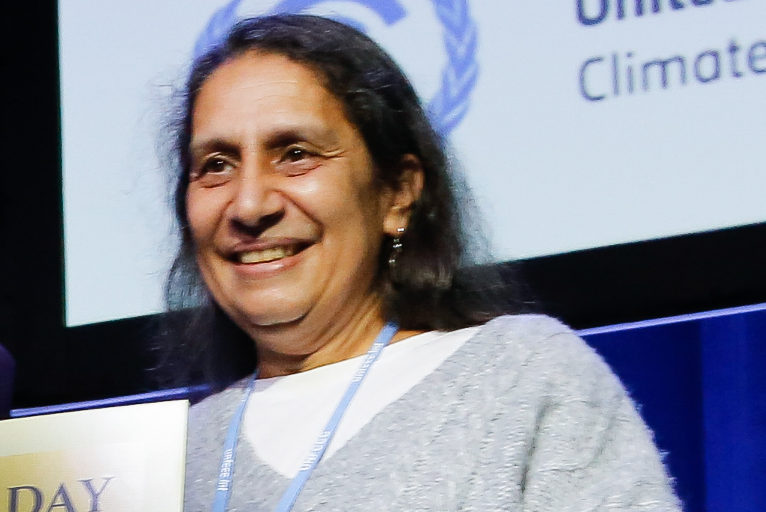It is increasingly clear that climate change is a social justice issue that can be resolved only if global inequalities are addressed. There is a well-documented wealth gap – reflecting historical injustices and unequal power relations – between the nations responsible for emissions and those forced to deal with their harsh effects, which range from flooding to droughts and wildfires.
For all too long, white men in the Global North – largely untouched by the catastrophic realities of climate change – have dominated the climate debate. Those in the Global South, particularly women and Indigenous communities, have been ignored. The result is emissions that are higher than ever and a lack of climate finance to support mitigation and adaptation actions, and loss and damage.
Meanwhile, business-as-usual ‘solutions’, such as carbon offsetting, seem to worsen rather than address global inequalities. Oil giant Shell, for example, plans to offset 120 million tonnes of carbon dioxide from its polluting activities with large-scale tree plantations that are likely to drive land grabs in the Global South.
As Kenyan environment and climate activist Elizabeth Wathuti said:
“If we are serious about tackling the climate crisis we need to start listening and feel the pain of those suffering the consequences already today.”
This is not just a plea for representation, although that is important. “The master’s tools will never dismantle the master’s house,” to quote American civil rights activist Audre Lorde. To tackle the climate crisis and achieve climate justice, we need radically different ‘tools’, leadership and principles. And it is women and feminists who have a lot to offer, especially those from the Global South who have a long history of fighting inequality and building inclusive solutions. It is these women, from diverse backgrounds, who are becoming increasingly visible in the fight for climate justice.
As the host of the ‘People vs Inequality’ podcast, I’ve had the honour of interviewing six of the most inspiring climate leaders of today. I was struck by something they had in common; all six women demonstrated bold, courageous leadership, used to try to shift power towards those most affected by climate change. Regardless of whether they consider themselves feminists, their stories are powerful illustrations of feminist leadership and principles. So what is it that they do and what can we – from activists to policymakers – learn about how to achieve climate justice?
Building a caring world
All six climate leaders were inspired to work for climate justice because of their strong connection to nature, as well as to other activists and the communities affected by the climate crisis. Activist Elizabeth Wathuti is following in the footsteps of the late Wangari Maathai, the Kenyan environmentalist who became the first African woman to win the Nobel Peace Prize after building women’s movements through tree planting and defending nature.
Like Maathai, Wathuti shows how to nurture leadership qualities in young people by engaging with them and teaching them not only to plant trees – but how to grow them. She uses her platforms to share the stories of fellow Kenyans facing climate change effects such as drought, and calls on leaders to open their hearts and humanise the climate crisis.
Regenerating nature, expressing solidarity and building a caring economy are all increasingly recognized as central to creating a more just and sustainable world. And feminists have long shown how to build this into their daily lives, their activism and their policy proposals.
Sharing power
History has taught us that change is possible only when people join hands for collective action. Another woman I spoke with, Victoria Tauli-Corpuz, an Indigenous rights activist and former UN rapporteur, helps to enhance the capacities of women and their communities to advocate for their rights.
She reminds us of the knowledge and solutions that Indigenous peoples have long held when it comes to protecting our planet. Young climate activists and feminists such as Chihiro Geuzenbroek are committed to radical inclusion, making sure that excluded voices are heard. Geuzenbroek highlights the need, particularly for those of us in the Global North, to challenge our own behaviours and mindsets. These feminist leaders also show us how to come together across movements, breaking down the silos that constrain a unified approach to holistic solutions.
Being brave and bold
We need radical change in policy and practice, which requires shifting power away from polluters towards the most affected and those seeking just and sustainable solutions. In one episode of ‘People vs Inequality’, human rights lawyer Tessa Khan explained what this means in practice. She has a clear mission and a comprehensive strategy that brings together citizens, workers and environmental organisations for a just and fossil-free UK. She shows the agency we have and the importance of getting more people on board.
Longstanding climate leaders Tasneem Essop and Farhana Yamin also explicitly challenge the imbalances of power, the lack of global solidarity and the focus on economic growth. Both show how to build organisations that represent the world they want to see.
Policymakers often fail to address the power that is invisible – norms, for instance – or hidden – corporate lobbying – which hold back change. To replace short-termism with structural solutions, those in the climate space will need to be bold in their engagement with power. Feminist leaders are particularly good at this, because they have had to be. The tools and strategies they have developed to analyse, build, assert and transform power are useful to anyone keen to address the root causes of the climate crisis and build just solutions.
The challenges ahead of us are big and may, at times, seem insurmountable. They require a different type of leadership. The women working for climate justice show what feminist leadership is all about and why we need it.
Teaser photo credit: By Scottish Government – First Minister – COP26 OXFAM speech – Ray of the Day award, CC BY 2.0, https://commons.wikimedia.org/w/index.php?curid=113011434





